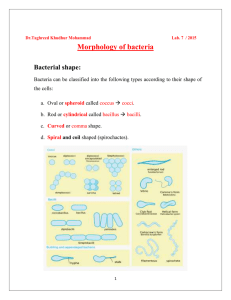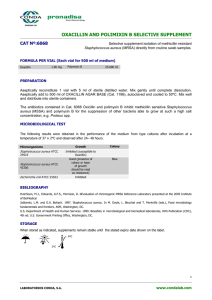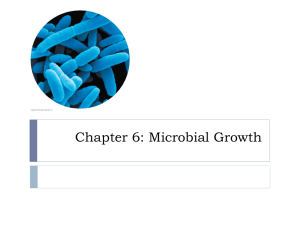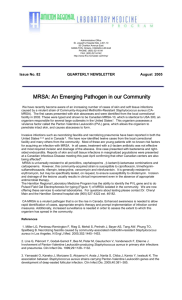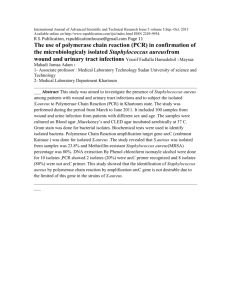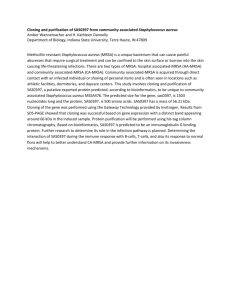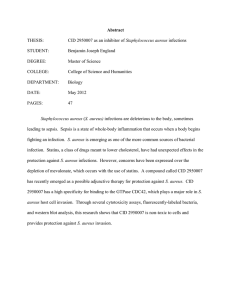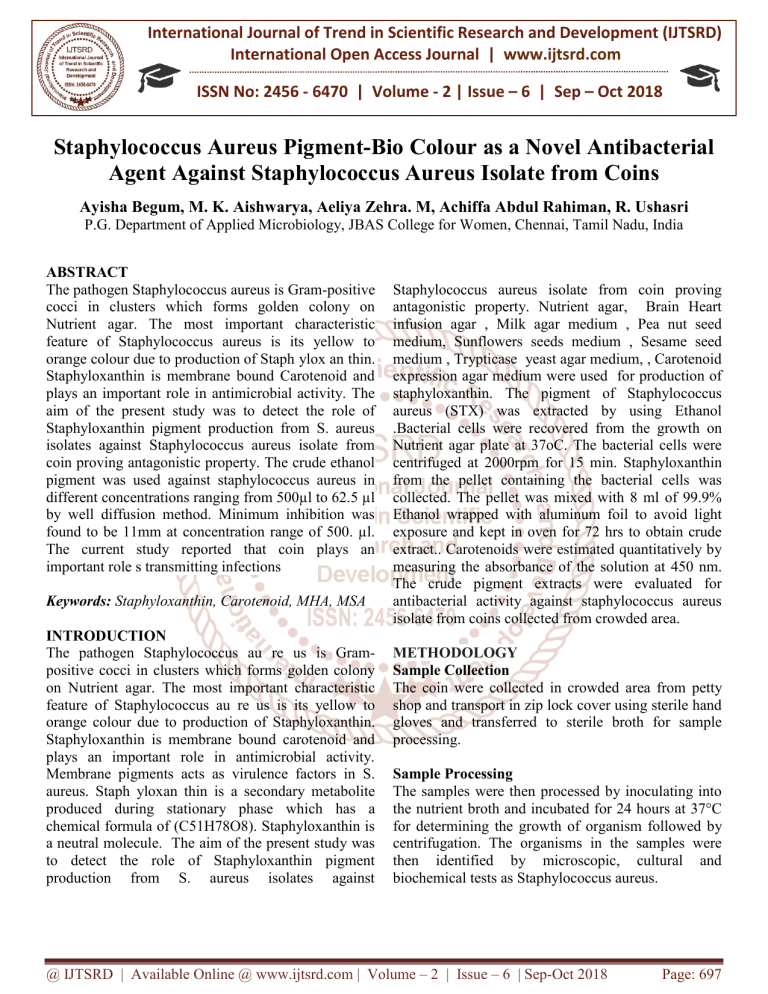
International Journal of Trend in Scientific Research and Development (IJTSRD)
International Open Access Journal | www.ijtsrd.com
ISSN No: 2456 - 6470 | Volume - 2 | Issue – 6 | Sep – Oct 2018
Staphylococcus Aureus Pigment-Bio Colour as a Novel Antibacterial
Agent Against Staphylococcus Aureus Isolate from Coins
Ayisha Begum, M. K. Aishwarya, Aeliya Zehra. M, Achiffa Abdul Rahiman, R. Ushasri
P.G. Department of Applied Microbiology, JBAS College for Women, Chennai, Tamil Nadu, India
ABSTRACT
The pathogen Staphylococcus aureus is Gram-positive
cocci in clusters which forms golden colony on
Nutrient agar. The most important characteristic
feature of Staphylococcus aureus is its yellow to
orange colour due to production of Staph ylox an thin.
Staphyloxanthin is membrane bound Carotenoid and
plays an important role in antimicrobial activity. The
aim of the present study was to detect the role of
Staphyloxanthin pigment production from S. aureus
isolates against Staphylococcus aureus isolate from
coin proving antagonistic property. The crude ethanol
pigment was used against staphylococcus aureus in
different concentrations ranging from 500µl to 62.5 µl
by well diffusion method. Minimum inhibition was
found to be 11mm at concentration range of 500. µl.
The current study reported that coin plays an
important role s transmitting infections
Keywords: Staphyloxanthin, Carotenoid, MHA, MSA
INTRODUCTION
The pathogen Staphylococcus au re us is Grampositive cocci in clusters which forms golden colony
on Nutrient agar. The most important characteristic
feature of Staphylococcus au re us is its yellow to
orange colour due to production of Staphyloxanthin.
Staphyloxanthin is membrane bound carotenoid and
plays an important role in antimicrobial activity.
Membrane pigments acts as virulence factors in S.
aureus. Staph yloxan thin is a secondary metabolite
produced during stationary phase which has a
chemical formula of (C51H78O8). Staphyloxanthin is
a neutral molecule. The aim of the present study was
to detect the role of Staphyloxanthin pigment
production from S. aureus isolates against
Staphylococcus aureus isolate from coin proving
antagonistic property. Nutrient agar, Brain Heart
infusion agar , Milk agar medium , Pea nut seed
medium, Sunflowers seeds medium , Sesame seed
medium , Trypticase yeast agar medium, , Carotenoid
expression agar medium were used for production of
staphyloxanthin. The pigment of Staphylococcus
aureus (STX) was extracted by using Ethanol
.Bacterial cells were recovered from the growth on
Nutrient agar plate at 37oC. The bacterial cells were
centrifuged at 2000rpm for 15 min. Staphyloxanthin
from the pellet containing the bacterial cells was
collected. The pellet was mixed with 8 ml of 99.9%
Ethanol wrapped with aluminum foil to avoid light
exposure and kept in oven for 72 hrs to obtain crude
extract.. Carotenoids were estimated quantitatively by
measuring the absorbance of the solution at 450 nm.
The crude pigment extracts were evaluated for
antibacterial activity against staphylococcus aureus
isolate from coins collected from crowded area.
METHODOLOGY
Sample Collection
The coin were collected in crowded area from petty
shop and transport in zip lock cover using sterile hand
gloves and transferred to sterile broth for sample
processing.
Sample Processing
The samples were then processed by inoculating into
the nutrient broth and incubated for 24 hours at 37°C
for determining the growth of organism followed by
centrifugation. The organisms in the samples were
then identified by microscopic, cultural and
biochemical tests as Staphylococcus aureus.
@ IJTSRD | Available Online @ www.ijtsrd.com | Volume – 2 | Issue – 6 | Sep-Oct 2018
Page: 697
International Journal of Trend in Scientific Research and Development (IJTSRD) ISSN: 2456-6470
Coin in nutrient broth
Identification of Staphylococcus
Staphylococcus was identified by Gram staining,
Hanging drop, catalase, and oxidase tests. The cultural
characteristics and biochemical characters were
performed to identify Staphylococcus.
Filtration of centrifuged supernatant broth
Extraction of pigment
The pigmented broth was transferred to sterile tubes
and centrifuged for 30 mins at 1500 rpm. The
supernatant was filtered by using sterile whats Mann
filter paper. The filtrate was extracted using ethanol
solvent. The filtrate was evaporated to extract crude
pigment and stored in vials for antibacterial activity.
Inoculation of staphylococcus aureus
In to nutrient broth
Crude ethanol pigment extract
MICROSCOPIC APPEARANCE
The inoculated colonies were observed for
microscopic appearance and identified as motile gram
positive cocci in clusters.
Gram positive cocci in clusters
Incubation of pigmented broth in rotary shaker at 37◦c
Red pigmented broth after 48 hrs.
@ IJTSRD | Available Online @ www.ijtsrd.com | Volume – 2 | Issue – 6 | Sep-Oct 2018
Page: 698
International Journal of Trend in Scientific Research and Development (IJTSRD) ISSN: 2456-6470
Yellow colonies on Mannitol salt agar
Preliminary Tests of Staphylococcus Aureus
Sl. no
Tests Observation
1.
Gram
Gram-Positive
staining cocci in clusters
2.
Motility Non motile
3.
Catalase Postive
4.
Oxidase Negative
Cultural Characters of Staphylococcus Aureus
S.
Colony
Inference
No
morphology
1-2 mm and yellow
1.
Size and colour
colonies
2.
Margin
Entire
3.
Shape
Circular
4.
Opacity
Opaque
5.
Consistency
Smooth
6.
Elevation
Convex
Coagulase positive – S.aureus
Antibiotic sensitivity test for the S. aureus
S.aureus was found highly sensitive to Erythromycin
followed by sensitive to clindamycin and vancomycin
and resistant to the antibiotic Penicillin.
Sl. no Antibiotics Zone of Inhibition
1.
Vancomycin
13 mm
2.
Erythromycin
25 mm
3.
Clindamycin
17 mm
4.
Penicillin
Resistant
Biochemical Characters of Staphylococcus Aureus
Isolation and identification of Staphylococcus aureus
from coin
Gram positive cocci in cluster
DNAse positive - S.aureus
@ IJTSRD | Available Online @ www.ijtsrd.com | Volume – 2 | Issue – 6 | Sep-Oct 2018
Page: 699
International Journal of Trend in Scientific Research and Development (IJTSRD) ISSN: 2456-6470
Yellow colonies on Mann itol salt agar
Antibiotic sensitivity test for S.aureus isolate from
coin
S. aureus was found highly sensitive to Amikiacin and
resistant to the antibiotics such as Ceftriax one,
Cefixime, Amorphicilin
Sl.No Antibiotics Zone Of Inhibition
1.
Vancomycin
13 mm
2.
Erythromycin
25 mm
3.
Clindamycin
17 mm
4.
Penicillin
Resistant
Antibacterial Activity of crude pigment extract
The antibacterial activity of crude ethanol pigment of
Staphylococcus aureus was determined by inoculating
Staphylococcus aureus isolate in to Nutrient broth and
incubated for 24 hrs at 37◦c .The turbidity of broth
was compared to 0.5 N McFarland solutions. The
lawn was prepared using Staphylococcus aureus
isolate on Muller Hinton agar. The wells were cut
using sterile well puncher and one milli gram of
pigment extract was suspended in 100 µl of acetone
and 900 µl nutrient broth. Different concentrations of
pigment extracts ranging from500, 250, 125, 62.5 µl
were loaded in to wells using water as control. Muller
Hinton agar plate was incubated at 37 ◦c for 24 hrs
and observed for Zone formation.
Coagula se test – Positive for isolate from coin
Well diffusion method for- staphylococcus species
DNAse test – Positive for isolate Staphylococcus
aureus from coin
DISCUSSION
The pathogen Staphylococcus aureus is Gram-positive
cocci in clusters which forms golden colony on
Nutrient agar. The most important characteristic
feature of Staphylococcus aureus is its yellow to
orange colour due to production of Staphyloxanthin.
Staphyloxanthin is membrane bound carotenoid and
plays an important role in antimicrobial activity the
main aim of this study was to extract pigment and
determine the antibacterial activity against
Staphylococcus aureus isolated from coin exchanged
among the crowded population. The UV Visible
@ IJTSRD | Available Online @ www.ijtsrd.com | Volume – 2 | Issue – 6 | Sep-Oct 2018
Page: 700
International Journal of Trend in Scientific Research and Development (IJTSRD) ISSN: 2456-6470
spectro photometric studies showed highest peak
indicating estimation of pigment This study showed
that crude acetone pigment extracts exhibited most
potent antibacterial activity against Staphylococcus
aureus isolate by performing well diffusion using
different concentrations of crude pigment extract
ranging from 500µl to 62.5 µl exhibiting inhibitory
values of 11mm The isolate was found to be resistant
to pigment extracts at concentration range of 250 µl
125 µl and 62.5 µl. Minimum bactericidal
concentrations was performed and found to be turbid
by showing cloudy appearance.
Summary and Conclusion
Staphyloxanthin is a secondary metabolite produced
by Staphylococcus aureus during stationary phase
which has a chemical formula of (C51H78O8).
Staphyloxanthin is a neutral molecule. The aim of the
present study was to detect the role of
Staphyloxanthin pigment production from S. aureus
isolates against Staphylococcus aureus isolate from
coin
proving
low
antagonistic
property.
Staphylococcus aureus was sub cultured and
inoculated in to Nutrient broth followed by incubation
at 37◦c for 48 hrs in rotary shaker for production of
pigment. The pigmented broth was centrifuged at
1500 rpm for 30 mins. The supernatant was filtered
using sterile what Mann filter paper. The filtrate was
mixed with ethanol and kept in oven overnight to
obtain crude extract. The crude extract was stored in
sterile storage vials for antibacterial study. The coin
was collected from public transport in crowded area
and transferred to sterile Zip lock cover using sterile
hand gloves. The coin was transferred to nutrient
broth in flask and incubated at 37◦c. The turbidity was
observed and microscopic examination was done by
Gram staining technique and found to be Gram
positive cocci in clusters. The broth culture was
inoculated in to Nutrient agar and Mann itol salt agar
and incubated for 24 hrs at 37◦c. Coagula se and
DNAse tests were performed to differentiate
Staphylococcus spp. Antibiotic sensitivity tests was
done to find out sensitivity of Staphylococcus .aureus
isolate to antibiotics. The isolate was found to be
highly resistant to Pencillin and sensitive to
Erythromycin. The crude ethanol pigment was used
against
staphylococcus
aureus
in
different
concentrations ranging from 500µl to 62.5 µl by well
diffusion method. Maximum inhibition was found to
be at different concentrations were found to be 11mm
at concentration range of 500. µl .The current study
reported that coin plays an important role s
transmitting infections .It was concluded that coin acts
as one of the factors for spread of infections. The
Staphy lox an thin acts as an important antagonist and
is a novel bio colour against Staphylococcus aureus is
olate from coins. This study was done for the first
time to the best of our Knowledge.
Acknowledgements
The Authors thank Ms Summera Rafiq, Associate
Professor& Head, P.G. Dept of Applied Microbiology
for her valuable support and Ms Tharani. V of M. Sc
II nd year, Microbiology for extended help in
providing culture,
REFERENCES
1. Daum, R. S. 2008 Removing the golden coat of
Staphylococcus aureus N. Engl. J. Med. 359, pp:
85–87
2. Marshall, J. H., and G. J. Wilmoth. 1981.
Proposed pathway of triterpenoid carotenoid
biosynthesis in Staphylococcus aureus: evidence
from a study of mutants. J. Bacteriol. 147, pp:
914-919
3. Clauditz A. Resch A.; Wieland KP. Peschel A and
Götz F 2006. Staphyloxanthin plays a role in the
fitness of Staphylococcus aureus and its ability to
cope with oxidative stress. Infect. Immun., 74(8),
pp: 4950-4953
4. Pelz A, Wieland KP, Putzbach K, Hentschel P,
Albert K, Götz F 2005. Structure and biosynthesis
of staphyloxanthin from Staphylococcus aureus. J.
Biol Chem. 280(37):32493-32498
5. Liu CI, Liu GY, Song Y, Yin F, Hensler ME, Jeng
WY, Nizet V, Wang AH, Oldfield E 2008. "A
cholesterol
biosynthesis
inhibitor
blocks
Staphylococcus aureus virulence". Science 319
(5868) pp: 391–94.
6. Rohmer, M., P. Bouvier, and G. Ourisson. 1979.
Molecular evolution of membranes: structural
equivalents and phylogenetic precursors of sterols.
Proc. Natl. Acad. Sci. U. S. A. 76 pp: 847– 851
7. Pelz A, Wieland KP, Putzbach K, Hentschel P,
Albert K, Götz F 2005. Structure and biosynthesis
of staphyloxanthin from Staphylococcus aureus. J
Biol Chem. 280(37) pp: 32493-32498 Al-Kazaz
et. Al. Iraqi Journal of Science, 2014, Vol 55,
No.4B, pp:1823-1832 1831
8. Hartmann, W., and H. J. Galla. 1978. Binding of
polylysine to charged bilayer membranes:
@ IJTSRD | Available Online @ www.ijtsrd.com | Volume – 2 | Issue – 6 | Sep-Oct 2018
Page: 701
International Journal of Trend in Scientific Research and Development (IJTSRD) ISSN: 2456-6470
molecular organization of a lipid peptide complex.
Biochim. Biophys. Acta 509, pp: 474–490.
9. Kim, J., M. Mosior, L. A. Chung, H. Wu, and S.
McLaughlin. 1991. Binding of peptides with basic
residues to membranes containing acidic
phospholipids. Biophys. J. 60 pp:135–148.
10. Hammond, R. K. and White, D. C. 1970.
Carotenoid Formation by Staphylococcus aureus.
J. of Bacteriol. 103(1) pp: 191-198
11. Wlliam, B. W;Paul D.V.George ,M. G. Dorothy,
J. Noel R. K. Wolfgang, L. Fred ,A. R. and Karl,
S. 2009. Bergey’s Manual of Systematic
Bacteriology 2nd edition Com.pp: .392-433.
13. Marshall JH, Wilmoth GJ. 1981. Pigments of
Staphylococcus aureus, a series of triterpenoid
carotenoids. J Bacteriol; 147 pp: 900-913.
14. Wieland B, Feil C, Gloria-Maercker E, Thumm G,
Lechner M, Bravo JM, Poralia K, Götz F 1994.
Genetic and biochemical analyses of the
biosynthesis of the yellow carotenoid 4,4'diaponeurosporene of Staphylococcus aureus. J.
Bacteriol., 176(24) pp: 7719-7726.
15. Tao, N. Gao,Y. Liu,Y. and Ge, F. 2010.
Carotenoids from the Peel of Shatian Pummelo
(Citrus grandis Osbeck) and Antimicrobial
Activity. American Eurasian J. Agric & Environ.
Sci., 7(1) pp: 110-115.
12. Grinsted, J., and Lacey R. C 1973. Ecological and
genetic implications of pigmentation in
Staphylococcus aureus. J. Gen. Microbiol. 75 pp:
259-267.
@ IJTSRD | Available Online @ www.ijtsrd.com | Volume – 2 | Issue – 6 | Sep-Oct 2018
Page: 702

